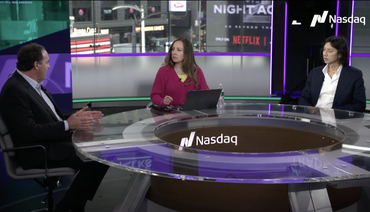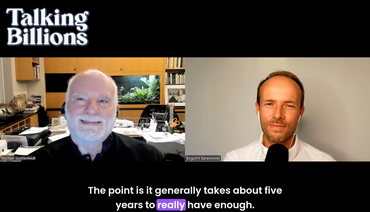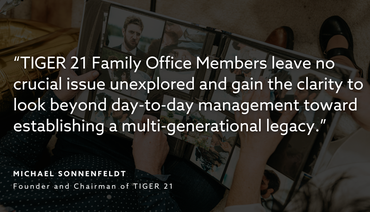TIGER 21 HOSTS 6TH ANNUAL MEMBERS CONFERENCE
Elite Group Brings Together Thought Leaders from Diverse Industries for Three-Day Conference
Beverly Hills, California ‚Äì February 18, 2016 ‚Äì TIGER 21, the premier peer-to-peer learning network for high-net-worth investors, met for its 6th Annual Members’ Conference February 3-5 at The Beverly Hilton in Beverly Hills, California. The conference was attended by a record number of attendees.
TIGER 21 members and their families had the opportunity to attend numerous discussions that spanned various topics from the state of the public and private equity markets, commodities markets, health and wellness, real estate, philanthropy, understanding the “science of success” and finally, at the forefront of everyone’s mind, the upcoming presidential election.
Key highlights from the 6th Annual Members Conference include:
New York Times columnist and Professor of Wharton School of Business at the University of Pennsylvania, Adam Grant, discussed the “science of success” and understanding how best to interact with the “givers,” “takers” and “matchers” among us. Using findings from his bestselling book “Give and Take: Why Helping Others Drives Our Success,” and from his latest, “Originals: How Non-Conformists Move the World,” he described how givers, while the most coveted employees, are at risk of being trampled by takers. In the longer term, givers’ generosity positively impacts sales, and they add general value to an organization as a result of their willingness to go above and beyond their job description. However, the negative impact of takers can often detract from their work and counterbalance their positive input. Grant closed by asserting he’s not sure if we’ve “seen a giver as president since Abraham Lincoln.
Thomas J. Barrack Jr., Executive Chairman of Colony Capital, spoke with TIGER 21 founder, Michael Sonnenfeldt, about an “Insider’s View on the Current Real Estate Market.” The man Fortune Magazine has called the “greatest real estate investor of all time” remarked that real estate is a hard asset and is by nature slow moving. Real estate is unforgiving when it comes to free cash flow, but when asked if it was meant for holding or trading, Barrack noted, “trading is where you find outsized returns.” Additionally, Barrack and Sonnenfeldt discussed the future of the market and the financial characteristics which make millennials fundamentally different from their parents.
“Millennials are less willing to buy, and more transitory than the generation before,” Barrack observed. For example, he cited the impact Amazon has had on bricks and mortar retailers, Expedia on hoteliers, and how WeWork is more valuable than the buildings it rents. While Airbnb is impacting the hotel business in a substantial way, he questioned how technology is going to disintermediate residential real estate and change the nature of residential buildings.
Additional panels included an interview where Pattie Sellers, Executive Director ofFortune, posed questions to renowned economist and Professor at the University of Chicago’s Booth School of Business, Richard Thaler. Professor Thaler challenged the commonly held assumption that rational behavior drives everything we do, from buying a car to investing in stocks. Instead, as the widely acclaimed father of behavioral economics, Thaler contended that everyday decisions we make as humans are driven by behavior and emotion. In understanding how and why, and by essentially recognizing our bias, we will be better equipped to make more prudent decisions ‚Äì not just in our daily lives, but in our financial dealings as well.
Klaas Baks, TIGER 21 Atlanta Chair, interviewed David Bonderman, Founding Partner of TPG and one of the most famous private equities investors in the world. Bonderman suggested the U.S. is most likely heading for a drawdown, not a recession, and we are not quite at the bottom of the cycle. Bonderman also stated that India should benefit from China’s slowdown as it does not have much trade with China and India is a large importer of hydrocarbons.
Numerous breakout panels focused on health and wellness-related issues including: recent innovations in modern medicine, genetics, nutrition and sleep. Speakers included Peter Attia, M.D., CEO of the Nutrition Science Initiative and Principal of Attia Medical PC; Beth Karlan, M.D., Physician-Scientist and Director of Cedars-Sinai’s Women’s Cancer Program; and Kirk Parsley, M.D., CEO of Doc Parsley LLC and Salutoceuticals, LLC.
The dinner discussion included a lively politically focused conversation moderated by TIGER 21 President Jonathan Kempner. Donna Brazile, Political Strategist and On-Air Contributor for CNN and ABC News, stated the implications of the Iowa caucus and what could be expected in upcoming primaries. During the conversation, it was noted that because the voter make-up has changed, both the Democrat and Republican parties are more narrowly focused at opposite ends of the spectrum, leading to more polarized views between the parties.
On the second day of the conference, TIGER 21 Members were given the option to join in on the conversation, with nearly two dozen discussions hosted by TIGER 21 partners. Topics ranged from investing in growth-market cities and middle-market private equity to opportunistic investing in Asia and estate planning during an election year.
From there, philanthropist Michael Milken, Chairman of The Milken Institute, provided a compelling presentation on “Unprecedented Times ‚Äì Unprecedented Opportunities.” His career has mirrored his four main professional passions: medical research, education, public health and access to capital. (Details are at www.mikemilken.com).
Key takeaways from Milken’s presentation include his assertions that:
- “Small companies are the lifeblood of the economy” and created 62 million jobs in the last third of the 20th century, even as large companies reduced workforces. This was achieved by expanding access to capital.
- The sharing economy is a new trend which cannot be ignored. Companies including Uber and Airbnb are disrupting the traditional business pattern.
- The population of sub-Saharan Africa will grow faster than any other global region in the 21st century.
- U.S. housing policy hurt the middle class by encouraging families to buy houses beyond their means when credit was cheap. Among low- to middle- income homebuyers, the purchase of excessively large properties on large lots far from employment centers contributed to environmental degradation, higher divorce rates, domestic abuse, and alcoholism.When prices fell during the last recession, homeowners and financial institutions both suffered. Milken juxtaposed the U.S. to other developed countries and showed that allocating less national resources to housing (resulting in smaller homes) allowed a higher allocation of resources to education and health, making those societies comparatively better off.
Attendees were also treated to a discussion between Gary Kaminsky, Senior Advisor to Morgan Stanley and Jeffrey Gundlach, CEO and CIO of DoubleLine Capital. Gundlach said, “Junk bonds are cheap today” – so it’s easy to be bearish, but he still wasn’t buying them. He predicted a redemption cycle is imminent and energy bankruptcies will make treasury bonds more appealing.
The lunch panel included an impressive group, which convened to talk about “Making an Impact – The Shared Perspectives on Philanthropy.” The panel, moderated by Joel Treisman, TIGER 21 New York Chair, included actor Richard Dreyfuss, Founder of The Dreyfuss Civics Initiative (www.thedreyfussinitiative.org); Reynold Levy, President of Robin Hood; and Abigail Noble, CEO of the ImPact. The three panelists, all involved in various philanthropic pursuits, shared the common perception how there is significant responsibility attached to wealth, and if affluent individuals leverage their funds they can propel impactful initiatives for social good.
“The investments you make can reflect your values and ultimately your legacy,” Noble explained, commenting that one of the Cofounders of The ImPact, Liesel Pritzker Simmons often remarks”how you invest is a moral decision.”
“Non-profits represent seven percent of the gross domestic profit in America and employ one out of every seven white collar workers. The third sector provides our Country with significant competitive advantage,” said Levy, noting more people volunteer and offer charitable gifts to non-profits than vote in national elections.
The conference closed with a panel called “Lights, Camera, Action ‚Äì A Conversation on Investing in Movies,” moderated by Anousha Sakoui, Entertainment Reporter with Bloomberg News. The panel consisted of Lorenzo di Bonaventura, President of Di Bonaventura Pictures, Inc. and Di Bonaventura Pictures Television; Stuart Ford, Founder and CEO of IM Global; and Molly Smith, Founder of Black Label Media.
Additional speakers Anita Heriot, CEO of Pall Mall Art Advisors, and Amanda Jungman, Founder of Socialite Auctions spoke about collecting contemporary and emerging art and luxury accessories. Tom Rogerson, Senior Managing Director & Family Wealth Strategist at Wilmington Trust, explained how communication style can both help and hurt your family.
“Our aim is to bring unique, valued content to our Members and to provide an environment that fosters meaningful, insightful discussion and builds rewarding, lasting relationships,” said Sonnenfeldt, TIGER 21 Founder.
About TIGER 21
TIGER 21 (The Investment Group for Enhanced Results in the 21st Century) is North America’s premier peer-to-peer learning network for high-net-worth investors. TIGER 21’s almost 400 Members collectively manage over $40 billion in personal assets and are entrepreneurs, investment partners and top executives. TIGER 21 focuses on improving investment acumen as well as exploring common issues of wealth preservation, estate planning and family dynamics. Founded in 1999, TIGER 21 is headquartered in New York City and has groups in Atlanta, Austin, Boston, Chicago, Dallas, Denver, Houston, Los Angeles, Miami, New York, Newport Beach, CA, Palm Beach, San Diego, San Francisco, San Juan, PR, Seattle, Tysons Corner, VA, and Washington, DC as well as Canadian groups in Calgary, Montreal, Toronto, and Vancouver. More information can be found at www.TIGER21.com.
Media Contacts:
Alison Smith, TIGER 21 │ Alison.Smith@TIGER21.com │212.584.0230
About TIGER 21
TIGER 21 is an exclusive global community of ultra-high-net-worth entrepreneurs, investors, and executives.
Explore the TIGER 21 Member Experience







